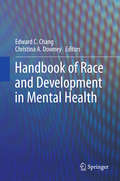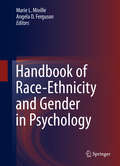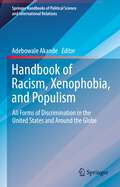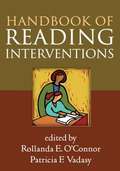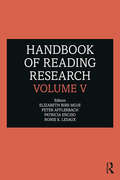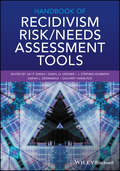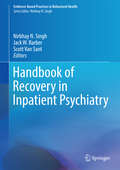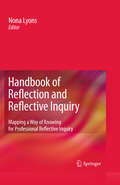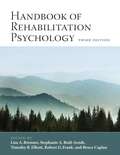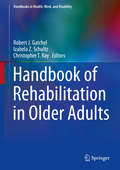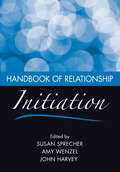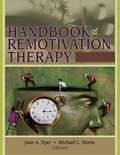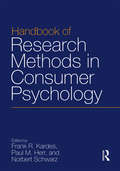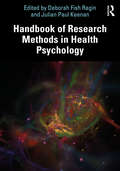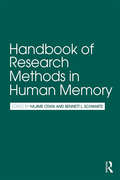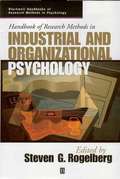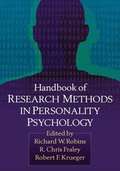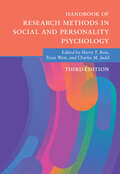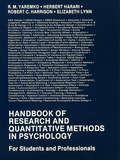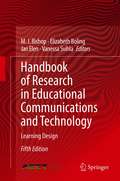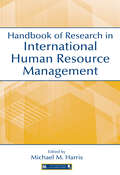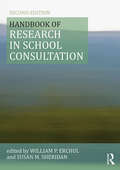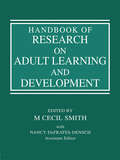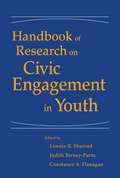- Table View
- List View
Handbook of Race and Development in Mental Health
by Edward Chang Christina A. DowneyThis project is unique in the field for a number of reasons, both in structure and in content. Specifically, it will have leading experts on specific age groups (Childhood to Adolescence, Young Adulthood to Middle Age, and The Elderly) within the cultural groups of interest (European-Americans, African-Americans, Asian-Americans, Hispanic-Americans, and Native Americans) contribute a chapter covering current research on both positive and negative functioning for each population. Each chapter will present basic demographic information, strengths that contribute to resilience, and three significant challenges each group faces to maintaining mental health. Each chapter will then include an integrative section, where ideas are advanced about how the strengths of each group can be harnessed to address the challenges that group faces. To conclude, each chapter will propose future directions for research which addresses integrative approaches to mental health for each group, and the implications that such approaches could have for future treatment. The main points of each section of each chapter will be visually summarized in a concluding table.
Handbook of Race-Ethnicity and Gender in Psychology
by Marie L. Miville Angela D. FergusonMulticultural aspects of psychology have received some attention in the literature in the last decade. A number of texts currently address these significant concerns, for example, Counseling the Culturally Different (Sue & Sue, 2008); Handbook of Multicultural Counseling ( Poterotto et l. , 2009); and Handbook of Multicultural Counseling Competencies (Pope-Davis & Coleman, 2005). In their most recent editions, several of these books address more nuanced complexities of diversity, for example, the intersections of gender or social class with race-ethnicity. Meanwhile, other texts have addressed gender issues in psychology (Handbook of Counseling Women, Counseling Men), with some attention paid to racial-ethnic and other diversity concerns. Clearly the progression of scholarship in this field reflects the importance of incorporating multiple aspects of diversity within psychology. However, no book currently exists that fully addresses the complexities of race-ethnicity and gender together. Better understanding of the dual impact of race-ethnicity and gender on psychological functioning may lead to more effective conceptualizations of a number of mental health issues, such as domestic violence, addictions, health-related behaviors and achievement. Exploring the impact of race-ethnicity and gender also may provide a broader understanding of self-in-community, as this affects individuals, families and other social groups and work and career development. Topics of interest may include identity development, worldviews and belief systems, parenting styles, interventions for promoting resilience and persistence and strategies for enhancing more accurate diagnostic and treatment modalities. Today's world is comprised of multiple and intersecting communities that remain in need of psychological models and interventions that support and promote both individual and collective mental health. We believe that utilizing unidimensional conceptual models (e. g. focusing solely on race-ethnicity or gender) no longer adequately addresses psychological concerns that are dynamic, complex and multi-faceted. The proposed Handbook will focus on timely topics which historically have been under-addressed for a number of diverse populations.
Handbook of Racism, Xenophobia, and Populism: All Forms of Discrimination in the United States and Around the Globe (Springer Handbooks of Political Science and International Relations)
by Adebowale AkandeThis handbook presents the roots of symbolic racism as partly in both anti-black antagonism and non-racial conservative attitudes and values, representing a new form of racism independent of older racial and political attitudes. By doing so, it homes in on certain historical incidents and episodes and presents a cogent analysis of anti-black, Jim Crowism, anti-people of color (Black, Latino, Native Americans), and prejudice that exists in the United States and around the world as a central tenet of racism. The book exposes the reader to the nature and practice of stereotyping, negative bias, social categorization, modern forms of racism, immigration law empowerment, racialized incarceration, and police brutality in the American heartland. It states that several centuries of white Americans’ negative socializing culture marked by widespread negative attitudes toward African Americans, are not eradicated and are still rife. Further, the book provides a panoramic view of trends of racial discrimination and other negative and desperate challenges that Black, Indigenous, and People of Color face across the world. Finally, the volume examines xenophobia, racism, prejudice, and stereotyping in different contexts, including topics such as Covid-19, religion and racism, information manipulation, and populism. The book, therefore, is a must-read for students, researchers, and scholars of political science, psychology, history, sociology, communications/media studies, diplomatic studies, and law in general, as well as ethnic and racial studies, American politics, global affairs, populism, and discrimination in particular.
Handbook of Reading Interventions
by Patricia Vadasy Rollanda O'ConnorComprehensive, authoritative, and designed for practical utility, this handbook presents evidence-based approaches for helping struggling readers and those at risk for literacy difficulties or delays. Leading experts explain how current research on all aspects of literacy translates into innovative classroom practices. Chapters include clear descriptions of effective interventions for word recognition, spelling, fluency, vocabulary, comprehension, and writing, complete with concrete examples and teaching scripts. Coverage also encompasses preschool literacy instruction and interventions for older readers, English language learners, and students with learning disabilities, as well as peer-mediated and tutoring approaches.
Handbook of Reading Research, Volume V
by Elizabeth Birr Moje Peter P. Afflerbach Patricia Enciso Nonie K LesauxIn a time of pressures, challenges, and threats to public education, teacher preparation, and funding for educational research, the fifth volume of the Handbook of Reading Research takes a hard look at why we undertake reading research, how school structures, contexts and policies shape students’ learning, and, most importantly, how we can realize greater impact from the research conducted. A comprehensive volume, with a "gaps and game changers" frame, this handbook not only synthesizes current reading research literature, but also informs promising directions for research, pushing readers to address problems and challenges in research design or method. Bringing the field authoritatively and comprehensively up-to-date since the publication of the Handbook of Reading Research, Volume IV, this volume presents multiple perspectives that will facilitate new research development, tackling topics including: Diverse student populations and sociocultural perspectives on reading development Digital innovation, literacies, and platforms Conceptions of teachers, reading, readers, and texts, and the role of affect, cognition, and social-emotional learning in the reading process New methods for researching reading instruction, with attention to equity, inclusion, and education policies Language development and reading comprehension Instructional practices to promote reading development and comprehension for diverse groups of readers Each volume of this handbook has come to define the field for the period of time it covers, and this volume is no exception, providing a definitive compilation of current reading research. This is a must-have resource for all students, teachers, reading specialists, and researchers focused on and interested in reading and literacy research, and improving both instruction and programs to cultivate strong readers and teachers.
Handbook of Recidivism Risk / Needs Assessment Tools
by Jay P. Singh Daryl G. Kroner J. Stephen Wormith Sarah L. Desmarais Zachary HamiltonProvides comprehensive coverage on recidivism risk/needs assessment tools Correctional and healthcare professionals around the world utilize structured instruments referred to as risk/needs assessment tools to predict the likelihood that an offender will recidivate. Such tools have been found to provide accurate and reliable evaluations and are widely used to assess, manage, and monitor offenders both institutionally as well as in the community. By identifying offenders in need of different levels of intervention, examining causal risk factors, and individualizing case management plans, risk/needs assessment tools have proven invaluable in addressing the public health issue of recidivism. Recidivism Risk/Needs Assessment Tools brings together the developers of the most commonly-used risk/needs assessment tools to provide a comprehensive overview of their development, peer-reviewed research literature, and practical application. Written by the leading professionals in the field of risk/needs assessment, the book provides chapters on: Recidivism Risk Assessment in the 21st Century; Performance of Recidivism Risk Assessment Instruments in Correctional Settings; Correctional Offender Management Profiles for Alternative Sanctions (COMPAS); the Federal Post-Conviction Risk Assessment Instrument; the Inventory of Offender Risks, Needs, and Strengths (IORNS); the Level of Service (LS) Instruments; the Ohio Risk Assessment System (ORAS); the Self-Appraisal Questionnaire (SAQ); the Service Planning Instrument (SPIn); the Static Risk Offender Needs Guide-Revised (STRONG-R); the Offender Group Reconviction Scale (OGRS); the Forensic Operationalized Therapy/Risk Evaluation System (FOTRES); the RisCanvi; and more. Systematically identifies currently-validated recidivism risk/needs assessment tools Reviews research on recidivism risk/needs assessment tools used internationally Each chapter presents sufficient detail to decide whether a given recidivism risk/needs assessment tool is right for your practice Recidivism Risk/Needs Assessment Tools is ideal for correctional, probation and parole, and behavioral health professionals.
Handbook of Recovery in Inpatient Psychiatry
by Nirbhay N. Singh Jack W. Barber Scott Van SantThis handbook provides a guide for individualized, responsive, and meaningful care to patients with severe mental illness. It begins with an overview of the foundational aspects of recovery - definitions and assessment, recovery principles, recovery research, and applications of recovery principles in in inpatient psychiatry. Subsequent chapters offer in-depth analyses of provider competencies, the patient's role in personal choices and decision making, and the deeper healing goals of recovery. The handbook also offers detailed treatment modalities, including cognitive remediation, psychological and psychiatric services, nursing and occupational therapy services, peer support, and pharmacological treatment. Featured topics include: Sexuality and sexual health in the inpatient psychiatric setting. The power of stigma and the usage of SAMHSA (Substance Abuse and Mental Health Services Administration) principles to combat stigma. Legal advocacy. Self-advocacy and empowerment. Methods to enhance resilience and sustain recovery in inpatients. Common errors and solutions during the transformation to recovery-oriented systems. The Handbook of Recovery in Inpatient Psychiatry is a must-have resource for researchers, graduate students, clinicians, and related professionals/practitioners in psychology, psychiatry, social work, nursing, rehabilitation therapy, occupational therapy, physical therapy, and allied professionals in related mental health and medical disciplines.
Handbook of Reflection and Reflective Inquiry
by Nona LyonsPhilosophers have warned of the perils of a life spent without reflection, but what constitutes reflective inquiry - and why it's necessary in our lives - can be an elusive concept. Synthesizing ideas from minds as diverse as John Dewey and Paulo Freire, theHandbook of Reflection and Reflective Inquiry presents reflective thought in its most vital aspects, not as a fanciful or nostalgic exercise, but as a powerful means of seeing familiar events anew, encouraging critical thinking and crucial insight, teaching and learning. In its opening pages, two seasoned educators, Maxine Greene and Lee Shulman, discuss reflective inquiry as a form of active attention (Thoreau's "wide-awakeness"), an act of consciousness, and a process by which people can understand themselves, their work (particularly in the form of life projects), and others. Building on this foundation, the Handbook analyzes through the work of 40 internationally oriented authors: - Definitional issues concerning reflection, what it is and is not; - Worldwide social and moral conditions contributing to the growing interest in reflective inquiry in professional education; - Reflection as promoted across professional educational domains, including K-12 education, teacher education, occupational therapy, and the law; - Methods of facilitating and scaffolding reflective engagement; - Current pedagogical and research practices in reflection; - Approaches to assessing reflective inquiry. Educators across the professions as well as adult educators, counselors and psychologists, and curriculum developers concerned with adult learning will find the Handbook of Reflection and Reflective Inquiry an invaluable teaching tool for challenging times.
Handbook of Rehabilitation Psychology
by Bruce Caplan Lisa A. Brenner Stephanie A. Reid-Arndt Timothy R. Elliott Robert G. FrankThe field of rehabilitation has undergone major change, shifting toward an emphasis on health outcomes and understanding multiple determinants of health. Person-centered care and evidence-based medicine have become central considerations, and rehabilitation psychologists are at the forefront of this modern, whole-person approach. <p><p>The handbook has been significantly updated to reflect these new developments. Chapters address several core topics, such as education and training in rehabilitation psychology, competency-based practice, and fluctuating health policy. Additional chapters cover the assessment and treatment of specific health conditions, including chronic pain, acquired disability, spinal cord injury, traumatic brain injury, and amputation. This edition also includes information about artificial intelligence, virtual reality, public health, community rehabilitation, and other innovations in health care. <p><p>Contributors are not only visionaries in the rehabilitation field but also expert practitioners in key areas. They integrate their experience with empirical research, highlight methodological advances, recommend best practices, discuss policy implications, and identify possibilities for the future. Both experienced clinicians and early-career practitioners will find this book an invaluable resource for delivering effective behavioral health care to people with chronic health conditions.
Handbook of Rehabilitation in Older Adults (Handbooks in Health, Work, and Disability)
by Izabela Z. Schultz Robert J. Gatchel Christopher T. RayThis book discusses the state of the research and cutting-edge practice with regard to chronic illnesses and rehabilitation in older adults. It emphasizes biopsychosocial and culturally appropriate rehabilitation approaches to reduce the degree of disability and maximize independence in the activities of daily living among the burgeoning aging population. Organized in four sections—Introduction and Overview, Major Illnesses and Problems in Aging Populations, Evaluation of Functional Rehabilitation Approaches for Aging Populations, and Future Clinical Research Needs—the book includes chapters on the “graying” of the West with implications for increased chronic illnesses and disabilities; a review of biopsychosocial rehabilitation approaches; important “aging” issues such as slips-and-falls, musculoskeletal pain, chronic disabling conditions such as cancer and cardiovascular disease, and work-related factors to maintain work engagement in older workers. The US Census Bureau projects that by the year 2030, about 20% of the U.S. population will be 65 or older, contributing to the increased concern about healthcare and rehabilitation issues among older adults. This work will be of interest to healthcare, rehabilitation, vocational, human resource and disability management professionals, policy makers as well as researchers in areas of aging, gerontology, chronic illness, disability, rehabilitation, social work, medicine and psychology.
Handbook of Relationship Initiation
by John Harvey Amy Wenzel Susan SprecherThe Handbook of Relationship Initiation is the first volume to focus specifically on the very beginning stage of relationships – their origin. In this Handbook, leading scholars on relationships review the literature on various processes related to the initiation of relationships: how people meet, communicate for the first time, and begin to define themselves as being in a relationship. Topics include attraction, mate selection, influence of social networks on relationship initiation, initiation over the internet, hook-ups among young adults, and flirting and opening gambits. In addition, the dark side of relationship initiation is considered, including unwanted relationship pursuit and barriers to relationship initiation including social anxiety. This volume provides an overdue synthesis of the literature on this topic. It is especially timely in view of the growing prevalence on relationship initiation online, through matchmaking and other social networking sites, which has increased awareness that science can be used to understand, create, and facilitate compatible matching. This Handbook provides an essential resource for an interdisciplinary range of researchers and students who study relationships, including social psychologists, communication scientists and scholars of marriage and the family.
Handbook of Remotivation Therapy
by Michael Stotts, L. Jean DyerFinally-a resource that describes the "how," "when," and "with whom" of remotivation therapy!In recent years, remotivation therapy has become an integral part of a patient care plan in a wide variety of settings. What started out as group therapy sessions in a psychiatric setting has expanded into a therapeutic modality effective in geriatric long-term and day care settings, social clubs, group homes for people who were formerly institutionalized, substance abuse centers, prisons, and most recently, in facilities that provide programs for patients with Alzheimer&’s or Huntington&’s disease. This book examines remotivation therapy in diverse settings that include volunteer and independent living programs, an area health education center, and a state mental hospital. You&’ll also find the results of studies conducted in more than a dozen settings with widely varied client populations. The Handbook of Remotivation Therapy will familiarize you with: the role of the therapist in both basic and advanced remotivation therapy-step-by-step instructions on what (and what not) to do questions and concepts to use in remotivation sessions, dealing with choices, realistic scenarios, reminiscing, and stimulation funding options for remotivation therapy programs the positive public relations impact for institutions that utilize remotivation therapy programs designing and assembling a collaborative team to provide remotivation therapy the fifty-year history of remotivation therapy-from its birth as the brainchild of Dorothy Hoskins Smith, to its initial clinical use at Philadelphia State Hospital, to the pioneering work of Walter F. Pullinger, Jr., and the roles of the Smith, Kline, and French Foundation and the National Remotivation Therapy Organization (NRTO)In the Handbook of Remotivation Therapy, you&’ll find chapters that thoughtfully explore the specifics of this type of group work: in rehabilitative settings, correctional institutions, nursing care facilities, mental health hospitals, and in long-term care settings in substance abuse prevention, treatment, and relapse prevention in conjunction with recreation therapy with deinstitutionalized clients with persons who have Huntington&’s disease with persons who have Alzheimer&’s diseaseRemotivation therapy deals with the strengths, rather than weaknesses, of the client, and can be performed by any trained health professional, social worker, relative, or technician. It saves time and money for mental health professionals with heavy caseloads by preparing noncommunicative clients for more advanced types of therapy. The Handbook of Remotivation Therapy can help you add this results-based and extraordinarily cost-effective group treatment modality to your therapeutic arsenal.
Handbook of Research Methods in Consumer Psychology
by Norbert Schwarz Frank R. Kardes Paul P. HerrWhat impact can various research methods have on consumer psychology? How can they help us understand the workings of the consumer mind? And how can the field of consumer psychology best utilize these methods? In the Handbook of Research Methods in Consumer Psychology, leading consumer psychologists summarize key aspects of the research process and explain how different methods enrich understanding of how consumers process information to form judgments and opinions and to make consumption-related decisions. Kardes, Herr, and Schwarz provide an in-depth analysis of the scientific research methods needed to understand consumption-related judgments and decisions. The book is split into five parts, demonstrating the breadth of the volume: classic approaches, contemporary approaches, online research methods, data analysis, and philosophy of science. A variety of leading researchers give insight into a wide range of topics, reflecting both long-standing debate and more recent developments in the field to encourage discussion and the advancement of consumer research. The Handbook of Research Methods in Consumer Psychology is essential reading for researchers, students, and professionals interested in consumer psychology and behavior.
Handbook of Research Methods in Health Psychology
by Deborah Fish Ragin; Julian Paul KeenanIn this comprehensive handbook, Ragin and Keenan present an all-encompassing analysis of the variety of different methods used in health psychology research. Featuring interdisciplinary collaborations from leading academics, this meticulously written volume is a guide to conducting cutting-edge research using tested and vetted best practices. It explains important research techniques, why they are selected and how they are conducted. The book critically examines both cutting-edge methods, such as those used in NextGen genetics, nudge theory, and the brain’s vulnerability to addiction, as well as the classic methods, including cortisol measurement, survey, and environmental study. The topics of the book span the gamut of health psychology field, from neuroimaging and statistical analysis to socioeconomic issues such as the policies used to address diseases in Africa, anti-vaxers, and the disproportionate impact of climate change on impoverished people. With each section featuring examples of best research practices, recommendations for study samples, accurate use of instrumentation, analytical techniques, and advanced-level data analysis, this book will be an essential text for both emerging student researchers and experts in the field and an indispensable resource in health psychology programs.
Handbook of Research Methods in Human Memory
by Bennett L. Schwartz Hajime OtaniThe Handbook of Research Methods in Human Memory presents a collection of chapters on methodology used by researchers in investigating human memory. Understanding the basic cognitive function of human memory is critical in a wide variety of fields, such as clinical psychology, developmental psychology, education, neuroscience, and gerontology, and studying memory has become particularly urgent in recent years due to the prominence of a number of neurodegenerative diseases, such as Alzheimer’s. However, choosing the most appropriate method of research is a daunting task for most scholars. This book explores the methods that are currently available in various areas of human memory research and serves as a reference manual to help guide readers’ own research. Each chapter is written by prominent researchers and features cutting-edge research on human memory and cognition, with topics ranging from basic memory processes to cognitive neuroscience to further applications. The focus here is not on the "what," but the "how"—how research is best conducted on human memory.
Handbook of Research Methods in Industrial and Organizational Psychology (Blackwell Handbooks of Research Methods in Psychology #8)
by Steven G. RogelbergHandbook of Research Methods in Industrial and Organizational Psychology is a comprehensive and contemporary treatment of research philosophies, approaches, tools, and techniques indigenous to industrial and organizational psychology. Only available research handbook for Industrial & Organizational Psychology. Contributors are leading methodological & measurement scholars. Excellent balance of practical and theoretical insights which will be of interest to both novice and experienced organizational researchers. Great companion to the content-oriented Handbooks. Now available in full text online via xreferplus, the award-winning reference library on the web from xrefer. For more information, visit www.xreferplus.com
Handbook of Research Methods in Personality Psychology
by Richard Robins R. Chris FraleyBringing together leading investigators, this comprehensive handbook is a one-stop reference for anyone planning or conducting research on personality. It provides up-to-date analyses of the rich array of methodological tools available today, giving particular attention to real-world theoretical and logistical challenges and how to overcome them. In chapters filled with detailed, practical examples, readers are shown step by step how to formulate a suitable research design, select and use high-quality measures, and manage the complexities of data analysis and interpretation. Coverage ranges from classic methods like self-report inventories and observational procedures to such recent innovations as neuroimaging and genetic analyses.
Handbook of Research Methods in Social and Personality Psychology
by Charles M. Judd Harry T. ReisThis indispensable sourcebook covers conceptual and practical issues in research design, methods of research, and statistical approaches in social and personality psychology. The chapters provide state-of-the-art treatment of various methods, written by key experts in the field. The primary purpose of the Handbook is to provide readable yet comprehensive chapters on the full range of methods and tools used by researchers in social and personality psychology. In addition, it will alert researchers to methodological possibilities they may not have thought of. Innovative research methods work best when they allow researchers to ask theoretically driven questions that could not have been asked previously, thereby enhancing the quality and depth of their empirical knowledge base. With the help of this text, both new and established social psychologists will learn about appropriate uses of each method and the opportunities they provide for expanding knowledge. The Handbook of Research Methods in Social and Personality Psychology will be invaluable to graduate students and established researchers alike.
Handbook of Research Methods in Social and Personality Psychology (Cambridge Handbooks in Psychology)
by Charles M. Judd Harry T. Reis Tessa WestThis indispensable collection provides extensive, yet accessible, coverage of conceptual and practical issues in research design in personality and social psychology. Using numerous examples and clear guidelines, especially for conducting complex statistical analysis, leading experts address specific methods and areas of research to capture a definitive overview of contemporary practice. Updated and expanded, this third edition engages with the most important methodological innovations over the past decade, offering a timely perspective on research practice in the field. To reflect such rapid advances, this volume includes commentary on particularly timely areas of development such as social neuroscience, mobile sensing methods, and innovative statistical applications. Seasoned and early-career researchers alike will find a range of tools, methods, and practices that will help improve their research and develop new conceptual and methodological possibilities. Supplementary online materials are available on Cambridge Core.
Handbook of Research and Quantitative Methods in Psychology: For Students and Professionals
by Elizabeth Lynn R.M. Yaremko Herbert Harari Robert C. HarrisonThis comprehensive reference organizes extensive definitions and examples of key concepts in quantitative research into a single, convenient source. Alphabetically arranged and cross-referenced, The Handbook of Research and Quantitative Methods In Psychology presents: * experimental procedures, * research designs, * statistical methods, * information theory, * psychophysics, * behavioral terminology, * scaling and testing.
Handbook of Research in Educational Communications and Technology: Learning Design
by Jan Elen M. J. Bishop Elizabeth Boling Vanessa SvihlaThe 5th edition of the prestigious AECT Handbook continues previous efforts to reach outside the traditional instructional design and technology community to the learning sciences and computer information systems communities toward developing a conceptualization of the field. However, given the pervasive and increasingly complex role technology now plays in education since the 1st edition of the Handbook in 1996, the editors have reorganized the research chapters in this edition to focus on the learning problems we are trying to solve with educational technologies, rather than to focus on the things we are using to solve those problems. Additionally, for the first time this edition of the Handbook reflects our field’s growing understanding of the importance of design scholarship to inform practice by including design case chapters. These changes for this edition of the Handbook are intended to bring educational technology research into the broader framework of educational research by elaborating on the role instructional design and technology plays as a scholarly discipline in addressing education’s increasingly complex issues.Provides comprehensive reviews of new developments in educational technology research and design practice.Includes concrete examples to guide future research and practice in the ways emerging technologies can be used to solve educational problems.Contains extensive references furnished to guide readers to the most recent research and design practice in the field of instructional design and technology.
Handbook of Research in International Human Resource Management (Organization And Management Ser.)
by Michael M. HarrisHandbook of Research in International Human Resource Management, a book in LEA‘s Organization and Management Series, provides a sophisticated, in-depth examination of research in international human resource management (IHRM). Editor Michael M. Harris compiles research in IHRM that is otherwise fragmented across numerous journals and conducted from
Handbook of Research in School Consultation (Consultation, Supervision, and Professional Learning in School Psychology Series)
by Susan M. Sheridan William P. ErchulNow in its second edition, the Handbook of Research in School Consultation provides the field of school-based consultation with a comprehensive volume examining research perspectives and methodologies, models of practice, and future research directions. Revised and updated, this collection brings together leading experts in the field, offering both producers and consumers of school consultation an invaluable snapshot of the current boundaries and rapidly growing content of the discipline. It touches upon not only the scientific progress of the field, but also upon the variety of cutting-edge techniques and approaches currently being developed with an eye toward a changing world. Perfect for school psychologists, and also appropriate for researchers, trainers, and school-based professionals such as special educators and school counselors, this handbook is an absolute necessity for those keeping pace with the innovating, evolving world of school consultation.
Handbook of Research on Adult Learning and Development
by M Cecil Smith Nancy DeFrates-DenschThe time is right for this comprehensive, state-of-the-art Handbook that analyzes, integrates, and summarizes theoretical advances and research findings on adult development and learning - a rapidly growing field reflecting demographic shifts toward an aging population in Western societies. Featuring contributions from prominent scholars across diverse disciplinary fields (education, developmental psychology, public policy, gerontology, neurology, public health, sociology, family studies, and adult education), the volume is organized around six themes: theoretical perspectives on adult development and learning research methods in adult development research on adult development research on adult learning aging and gerontological research policy perspectives on aging. The Handbook is an essential reference for researchers, faculty, graduate students and practitioners whose work pertains to adult and lifespan development and learning.
Handbook of Research on Civic Engagement in Youth
by Constance A. Flanagan Judith Torney-Purta Lonnie R. SherrodEngaging youth in civic life has become a central concern to a broad array of researchers in a variety of academic fields as well to policy makers and practitioners globally. This book is both international and multidisciplinary, consisting of three sections that respectively cover conceptual issues, developmental and educational topics, and methodological and measurement issues. Broad in its coverage of topics, this book supports scholars, philanthropists, business leaders, government officials, teachers, parents, and community practitioners in their drive to engage more young people in community and civic actions.
